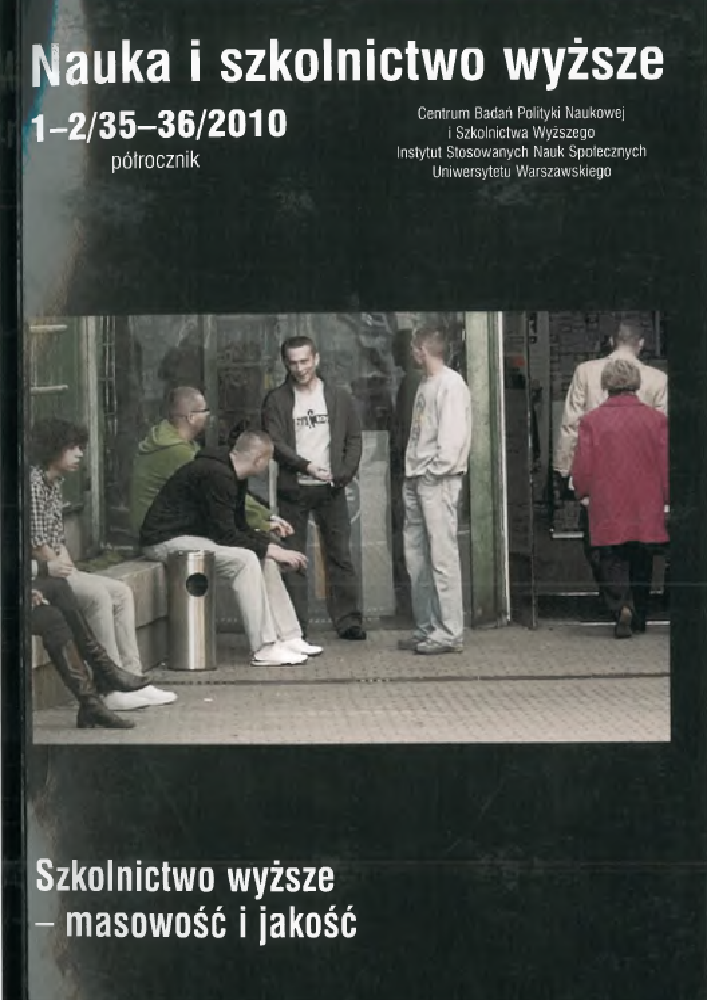Abstract
Academic centres have an important role to fulfil in the process of building a knowledge- based economy. In order to pursue this ambitious task, they will leverage their resources as it is within universities that knowledge is generated and interpreted as an overarching resource of any learning organisation. The mission of universities is not limited to education or research and development only. At present, this mission is understood much more broadly: as a contribution which will enhance the economic potential of the region where the university is located. The latter task is by no means easy, especially when combined with an array of challenges that a tertiary education system is faced with in the 21 st century. Among them, one may mention globalisation of educational services, facilitation of knowledge transfer and technology transfer or steps to adjust the available curricula and programmes to the needs reported by the labour market.
References
Antonowicz D. 2005 Uniwersytet przyszłości. Wyzwania i modele polityki, Instytut Spraw Publicznych, Warszawa.
Armstrong M. 2005 Zarządzanie zasobami ludzkimi, Oficyna Ekonomiczna, Kraków, wyd. III.
Bache 1.2006 The Europeanization of Higher Education: Markets Politics or Learning?, „Journal of Common Market Studies” , t. 44, nr 2.
Barczak B. 2006 Zarządzanie wiedzą jako czynnik zwiększania potencjału innowacyjnego firmy, „Zeszyty Naukowe Akademii Ekonomicznej w Krakowie”, nr 700.
Barnett R., Parry G., Coate K. 2001 Conceptualising Curriculum Change, „Teaching in Higher Education” , t. 6, nr 4.
Cooke Ph. 2006 Bliskość, wiedza i powstawanie innowacji, „Studia Regionalne i Lokalne”, nr 2 (24).
Europę 2020... 2010 Europe 2020. A European Strategy for Smart, Sustainable and lnclusive Growth, Communication from the Commission, COM (2010) 2020, Brussels, 3 marca.
Geremek B. 2001 Idea uniwersytetu, „Alma Mater. Miesięcznik Uniwersytetu Jagiellońskiego”, numer jubileuszowy (http://www3.uj.edu.pl/alma/alma/26/01/35.html).
Smoczyński W. 2008 Od ogona do gtowy - Europejski Wskaźnik Rozwoju, „Polityka”, nr 3.
Kafel T. 2005 Wyższe uczelnie ekonomiczne w procesie podnoszenia konkurencyjności przedsiębiorstw: nowe warunki, nowe możliwości, w: J. Bieliński (red.): Strategia Lizbońska a konkurencyjność gospodarki, Wydawnictwo CeDeWu, Warszawa.
Knowledge... 2000 Knowledge Management in the Learning Society, OECD, Paris.
Krawiec F. 2006 Mechanizmy transferu wiedzy i technologii, „Przegląd Organizacji” 2006, nr 7-8.
Kukliński A. 2003 Gospodarka oparta na wiedzy - społeczeństwo oparte na wiedzy - trajektoria regionalna. Artykuł dyskusyjny, „Nauka i Szkolnictwo Wyższe”, nr 2.
Lachę S. 2010 The Entrepreneurial University: A Key Factor for Regional Development in a Globalized Economy, (www.eui-net.org/Project_documents/Tallinn2006.../Lache_S%20ultima.doc).
Marszałek A. 2010 Rola uczelni w regionie, Wydawnictwo Difin, Warszawa 2010.
Mas-Colell A. 2003 The European Space of Higher Education: lncentive and Governance Issues, „Rivista di Politica Economica” , listopad - grudzień.
